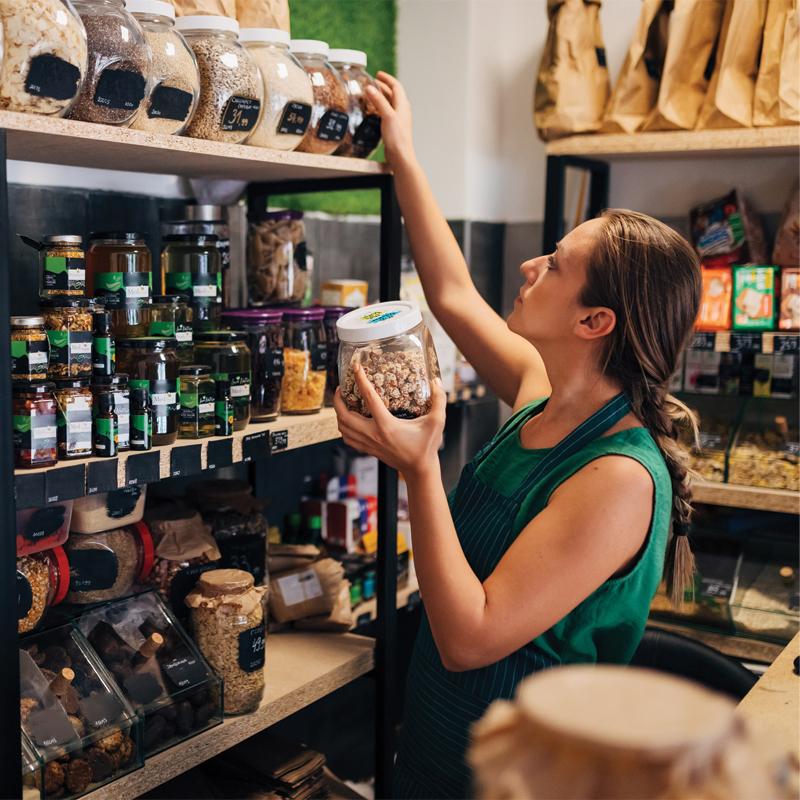The landscape of the food industry has seen a significant transformation over the past 20 years, particularly in the realm of plant-based and gluten-free products. This shift has been driven by a growing awareness of health and wellness, ethical considerations, and dietary needs.
The past: a limited market
Twenty years ago, the availability of plant-based and gluten-free products in the UK was relatively limited. The market was niche, with few companies catering to these dietary preferences. Consumers often had to seek out speciality stores or make their own meals from scratch.
Finding plant-based or gluten-free food was a struggle in mainstream supermarkets, let alone finding products that tasted good. Being a vegan meant eating mushrooms and tofu – so when faced with such limited products, it’s no wonder that many people were reluctant to try a plant-based diet. And those with coeliac disease faced difficulty due to the higher cost and limited availability of gluten-free foods, which most likely would have affected their emotional state and health-related quality of life.
The present: a flourishing industry
Fast forward to today, and the scenario has dramatically changed. Since 2020, the Food Standards Agency has been running a bi-annual survey called ‘Food and You 2’ across England, Wales, and Northern Ireland. Within this, they have been tracking dietary habits, and have found the number of vegans to be between one and two per cent. However, despite the low figure, research by Ipsos in 2022 found that 46% of Brits aged 16-75 were considering reducing their intake of animal products in the future and 58% of adults now use at least one plant-based meat alternative in their diet.
These statistics highlight just how fast the market is changing and growing and is also mirrored in the number of gluten-free products available. This growth in demand is largely driven by the increasing prevalence of coeliac disease and the shift of the population to a healthier diet.
The rise of plant-based and gluten-free diets has led to numerous companies stepping up to capitalise on the trend. Here are some that I think are excelling in the market:
Nomo
Nomo, a UK-based plant-based chocolate brand, has made a significant impact on the market since its launch in 2019. The brand has disrupted the free-from chocolate space by providing a delicious alternative that caters to a wide range of dietary requirements.
This commitment to inclusivity, catering to as many people as possible by ensuring that their products are both plant-based and free from dairy, gluten, egg, and nuts, has positioned Nomo at the forefront of the plant-based chocolate industry in the UK.
Nomo has become officially the number one plant-based and free-from chocolate brand in the UK, worth £9 million in retail sales value, with a market share of 24.4%.
Better Nature Tempeh
Better Nature Tempeh has made a significant impact in this space. Founded in 2018, it specialises in producing plant-based protein products including tempeh, which is made through fermenting cooked soybeans into a meaty block that is enriched in protein, prebiotics, and fibre. Their focus on nutritious and sustainable food options has resonated with consumers.
The company’s food science lab in Indonesia has managed to reduce the fermentation process from 48 to 18 hours, improving taste and efficiency without compromising nutrition. They have also increased the vitamin B12 content of tempeh and plan on increasing calcium and iron contents.
Huel
Combining the words ‘human’ and ‘fuel’, Huel is a fully plant-based organisation offering meal replacement shakes, snacks, and preprepared meals that prioritise health and nutrition. They sold over 100 million meals just five years after launching and every month, around 1.5 million people buy and consume Huel.
Established in 2012, Huel’s product range includes powders made from sustainable ingredients that contain essential vitamins and minerals, protein, essential fats, carbs, fibre, and phytonutrients. Their products cater to both plant-based and gluten-free diets, providing a convenient and affordable meal supplement option.
Oatly
Oatly, a Swedish alternative-milk brand, has made a significant impact on the plant-based and gluten-free market in the UK. In 2021, they announced plans to open one of the world’s biggest plant-based dairy factories in the UK. The site, which opened in 2023, has the capacity to produce up to 450 million litres of oat milk a year.
Oatly is committed to providing high-quality, plant-based, and gluten-free products that cater to a growing consumer demand for plant-based alternatives, expanding their product range regularly, and positioning themselves as leaders in the market.
Around Noon
Around Noon is another noteworthy company contributing to this market. With over 30 years’ experience in the food-to-go market, Around Noon produces high quality sandwiches, wraps, salads, breakfast options, hot food, snack pots, granola yogurts, and natural fruit juices. Their offerings cater to a wide range of dietary needs including plant-based and gluten-free.
While not a fully plant-based brand, there is huge benefit for companies like Around Noon expanding into this market. Non-vegan consumers are more likely to try plant-based options from brands they already know and trust, making the transition to plant-based food less daunting. Additionally, non-vegan brands often have a wider distribution network and are more readily available in supermarkets, and therefore more accessible.
When it comes to large household brands, these companies often have significant marketing resources and can use their influence to promote plant-based options, normalising the consumption of these products and making them more appealing to the mainstream market.
The future: a promising outlook
Looking ahead to the next five-to-10 years, the future of the plant-based and gluten-free market appears promising. The UK gluten-free foods market is anticipated to witness a compound annual growth rate of 8.7% from 2023 to 2030. Similarly, the plant-based market shows no sign of slowing down. Retail sales are expected to increase significantly.
As more people become aware of their dietary needs and preferences, brands that innovate and adapt will play a crucial role in shaping the future of this industry. By committing to providing high quality plant-based and gluten-free products, companies will not only cater to existing demand, but also encourage more people to explore these options.
In conclusion, the evolution of the plant-based and gluten-free market in the UK over the past 20 years is a testament to changing consumer behaviours and preferences. With continued innovation from companies mentioned in this article, this market is set for further growth in the coming years.
If you are looking to secure a talented professional for your team, we have recruitment experts who specialise in the food production and FMCG sector. Get in touch today.




